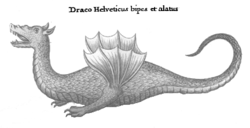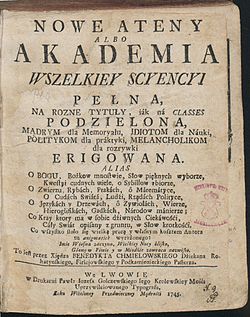- Nowe Ateny
-
 Illustration of a dragon from Nowe Ateny
Illustration of a dragon from Nowe Ateny
Nowe Ateny (New Athens) is the abbreviated title of the first Polish-language encyclopedia, authored by the 18th century Polish priest Benedykt Joachim Chmielowski. The first edition was published in 1745-1746 in Lwów (Lviv); the second edition, updated and expanded, in 1754-1764.
The first part of the full title was: New Athens or the Academy full of all science, divided into subjects and classes, for the wise ones to record, for the idiots to learn, for the politicians to practice, for the melancholics to entertain... (pl:Nowe Ateny albo Akademia wszelkiej sciencyi pełna, na różne tytuły jak na classes podzielona, mądrym dla memoryału, idiotom dla nauki, politykom dla praktyki, melancholikom dla rozrywki erigowana...).
Organization and content
The first edition of the encyclopedia contains 938 pages. It has a subject (not alphabetic) organization. Chmielowski compiled data from a few hundred references, dating from the Antiquity to his contemporary.
Almost every sentence in the book is in-line referenced, frequently in Latin, a lingua franca in Poland among the educated classes as in most of Central and Western Europe of the 18th century. To the data from the more than a hundred original authors, Chmielowski added personal annotations, some of which can be perceived as colorful today, for example, "Dragons existed for sure, I myself held, visiting Radziwills' castle, a rib of a dragon bigger than a regular sabre". Judging from the inclusion of numerous stories, anecdotes, and description of strange phenomena and exotic countries (like China, Japan), the encyclopedia was directed towards a rather popular audience and aimed to arise readers curiosity and desire for learning.
Legacy
The encyclopedia was the object of harsh critique in the Enlightenment period. It was given as an example of ignorance, stupidity and superstition, contrasting with the enlightenment ideas.
Nowe Ateny is the source of a few memorable and amusing "definitions", often quoted in Poland to this day:
- Horse is as everyone can see.
- Goats are a stinking kind of animal.
The humor was apparently unintentional by the author. Rather, he did not see the benefit of defining to his intended audience the most common animals of the time and place.
In modern Polish, the above definition of the horse is sometimes used as a colorful equivalent of the statement "the concept is more obvious than it appears to be from its more technical definition".
External links
- Text (Polish)
- Scanned text (Polish)
Categories:- 18th-century books
- Historical encyclopedias
- Polish encyclopedias
- Reference book stubs
- Poland stubs
Wikimedia Foundation. 2010.

